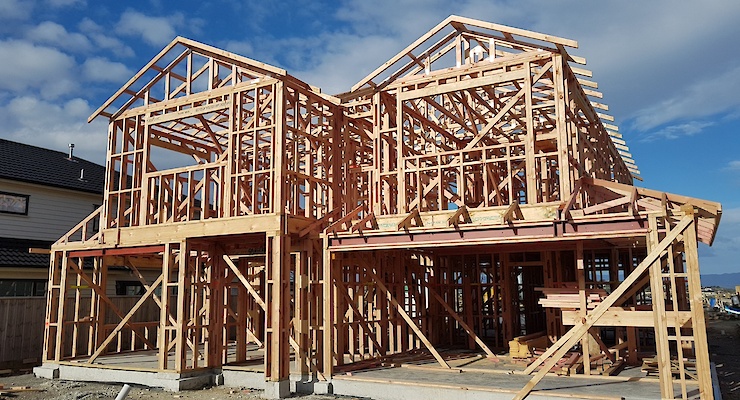


Mortgage Advisor & Director

Mortgage Advisor & Director

If you’re planning to buy a timber framed house, it’s important to understand that this type of property is typically considered ‘non-standard construction’, which can make it more difficult to get a mortgage. Here we’ll cover the key problems you might face along the way, how to get a mortgage on a timber framed house in the UK, and where to get expert advice to secure the best deal.
Why is it harder to get a mortgage on a timber framed house?
Mortgage lenders in the UK consider timber framed houses as non-standard construction because the quality of timber framed buildings isn’t standardised. So, the type of wood and surrounding construction can vary.
Although timber framed houses can be cheap, quick and efficient to build - certain lenders won’t be willing to offer a mortgage due to concerns about the quality of the construction, its current condition, and whether it’s insurable.
Key mortgage problems with timber framed houses
The key problems (in the eyes of mortgage lenders) for timber framed houses usually relate to:
- Structural quality - Sometimes timber structures are less secure and more susceptible to moisture and condensation problems.
- Future maintenance - Timber houses can require periodic inspections and treatments which can be costly.
- Weatherproofing - Timber can warp over time and there’s also the possibility of things like wind or fire damage.
- Insurability - It can be difficult to find adequate insurance for some timber houses.
- Difficulty reselling - Due to potential problems with certain timber houses, some lenders will be hesitant because the property will struggle to be resold in case of repossession.
Eligibility criteria
Here are some of the key factors that will be looked at when it comes to eligibility criteria for mortgages on timber framed houses:
- Age of the property: Lenders will want to know the exact age of the property because the construction quality of timber framed buildings can vary extensively. Typically, lenders prefer timber framed houses built after 1970, and may not offer mortgages for homes built between 1920 and 1965 due to the variety of building standards and materials used during this period.
- Type of timber construction: Mortgage lenders will want to know the exact construction of the entire property. This includes details of the materials surrounding the timber frame and the type of cladding used. If surveyors can’t access and inspect the timber frame, you may be required to take out extra insurance to account for any potential defects that aren’t visible.
- Property condition: Key concerns with timber framed houses relate to dampness and timber decay, as these properties can be more susceptible to moisture and weather damage. There can also be warping or insect problems. So, lenders will check the current condition for an insight into the construction quality and durability.
- Your deposit: Some lenders will require a higher deposit for a mortgage on a timber framed house. The exact deposit requirement and loan-to-value (LTV) ratio will depend on the specific property, your financial circumstances, and the lender. However, an experienced advisor can get a mortgage no matter the size of your deposit.
- Credit history: Lenders will look at your credit file to see your current and past credit history. Don’t fret if you have bad credit, it can make it harder to get a mortgage on a timber framed house, but a skilled mortgage broker will be able to find a solution and overcome any problems.
How to get a mortgage on a timber framed house
1.Here are some straightforward steps to follow if you want to get the best deal for a mortgage on a timber framed house:
1. Gather your details: Along with personal details (proof of address, identification, and 3 months of payslips and bank statements), you should get as much information as you can get your hands on about the timber framed house you want a mortgage for. This will ideally include the construction material specifics and the property’s age.
2. Get expert advice: It can be tough to get a mortgage for a timber framed building without advice from an expert mortgage broker. Getting advice is an important step because it will prevent any unnecessary rejections or unwanted marks on your credit file. It will also ensure you get the best terms and rates for your timber framed mortgage.
3. Apply for a mortgage: Once your broker has checked over your personal details (including a review of your credit reports), and assessed the construction details of the timber framed house, they’ll introduce you to the right lender for your circumstances. Your broker will also help walk you through the application process from start to finish.
If you want to speak to one of our experienced brokers who specialises in mortgages for timber framed houses, you can get started here with a free, no obligation chat:

Get non-standard construction mortgage advice today
Available lenders
Some banks and major lenders are open to offering mortgages on timber framed houses. However, they can be extremely strict with their eligibility criteria, with no flexibility or room for manoeuvre which can lead to problems.
For example, here are some of the rules for banks and high street lenders who might consider a mortgage on a timber framed house:
- Halifax: For any timber framed house where the cavity, between frame and cladding, has been retrospectively filled with an insulation material - Halifax will decline mortgage applications. Largely because this could trap moisture and lead to issues like timber rot.
- HSBC: Won’t offer mortgages for timber framed houses built between 1920 and 1965, and HSBC has an 80% LTV maximum for any acceptable properties.
- Nationwide: Although Nationwide will consider properties using Modern Methods of Construction (MMC) like timber framed properties built after 1970 (with outer walls of brick/stone/block), they also need you to provide confirmation/evidence from the British Board of Agrément (BBA) or a similar accreditation about the construction.
Unfortunately, most high street lenders don’t want to deal with anything other than standard construction properties, because it’s just not worth their resources to look at a property in such detail. However, this is where niche or specialist lenders become extremely useful because they can afford to put in the extra time and effort.
Are mortgage rates higher for timber framed houses?
Yes, the rates can be higher for timber framed houses. This is so that lenders can offset the perceived risk of properties built using timber and wood. However, there are ways you can ensure you’re getting the best rate possible.
Using a larger deposit is a simple alternative to offset a lender’s risk and can sometimes lead to better rates. Also, improving your credit score can lead to better rates - a skilled broker can give you advice and direction with this.
If neither of those options work, you can still get competitive rates by dealing with a mortgage lender that is more comfortable with non-standard construction properties - or even one that specialises in timber framed houses.
Speak to a broker who specialises in mortgages for timber framed houses
It’s difficult to get a mortgage on a timber framed house without some expert advice and guidance. You’ll often need to approach specialist lenders who can be more flexible and have competitive rates that usually aren’t advertised.
Because our brokers specialise in non-standard construction properties like timber framed buildings, they can review the property you want to buy, evaluate your finances, and then introduce you to the best lender for your circumstances.
Here are some more of the reasons people choose us when getting a mortgage for a timber framed house:
- Our brokers specialise in non-standard construction properties
- We can introduce you to flexible lenders with great rates
- Your first chat is free with no obligation to proceed
- We are 5-star rated on leading review sites
Ready to take advantage of a free, no-obligation chat with a broker who specialises in timber framed houses? Get started here.
FAQs
No, a timber clad house is a property with exterior walls covered in a layer of timber boards, but the overall structure might be made from something else like brick or stone. Whereas, with timber framed houses, the primary structure is wood.
It is generally easier to get a mortgage on a property that has this type of construction, compared to a timber framed one. However, some lenders are cautious about timber-clad homes as it requires regular maintenance, and if not maintained, can negatively impact the condition and house value.
If the property doesn't have brickwork underneath the cladding, this could also ring alarm bells for lenders.
Some lenders will only consider properties with wooden cladding on the ground floor where it is more accessible for maintenance.
Choosing an Adviser
Selecting a qualified and experienced mortgage adviser is of great importance. To choose a suitable adviser, evaluate their qualifications, experience, and reputation, and ensure they are regulated by the Financial Conduct Authority (FCA).
Read reviews from previous clients and make sure they provide a clear explanation of the products and services they offer, as well as the fees and charges associated with them.

























































































































































